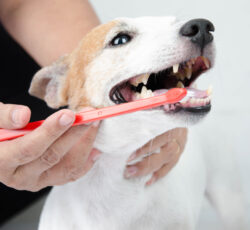Dog Dental Hygiene
 When it comes to our pets, dental hygiene is often overlooked. However, just like humans, dogs can develop dental problems if proper care is not taken. Dental issues in dogs can lead to discomfort, bad breath, and even more serious health concerns. In this blog post, we will discuss the importance of dog dental hygiene and provide tips on how to keep your furry friend’s teeth in optimal condition.
When it comes to our pets, dental hygiene is often overlooked. However, just like humans, dogs can develop dental problems if proper care is not taken. Dental issues in dogs can lead to discomfort, bad breath, and even more serious health concerns. In this blog post, we will discuss the importance of dog dental hygiene and provide tips on how to keep your furry friend’s teeth in optimal condition.
The Importance of Dog Dental Hygiene
Maintaining good dental hygiene for your dog is essential for several reasons. Here are a few key reasons why you should prioritize your pet’s dental health:
1. Preventing Dental Disease: Periodontal disease is one of the most common dental conditions in dogs. This disease is caused by the accumulation of plaque and tartar on their teeth. If left untreated, it can lead to gum inflammation, tooth decay, and even tooth loss.
2. Promoting Overall Health: Dental issues in dogs can also affect their overall health. The bacteria in their mouth can enter the bloodstream and potentially cause problems in the heart, kidneys, and liver. Regular dental care can help prevent these issues and promote your dog’s overall well-being.
3. Avoiding Bad Breath: Bad breath is a common sign of dental problems in dogs. While it may seem like a minor inconvenience, chronic bad breath can indicate underlying dental issues that should be addressed.
Tips for Dog Dental Hygiene
Now that we understand the importance of dog dental hygiene, let’s explore some tips on how to keep your furry friend’s teeth healthy and clean:
1. Regular Teeth Brushing
Brushing your dog’s teeth is one of the most effective ways to maintain good oral hygiene. Use a toothbrush and toothpaste specifically designed for dogs. It’s important to note that human toothpaste should never be used as it can be harmful to dogs.
Start slowly by introducing your dog to the toothbrush and toothpaste. Gradually build up to brushing their teeth for a few minutes every day. Focus on the outer surfaces of the teeth, as that’s where most plaque and tartar buildup occurs. Be patient and reward your dog with treats or praise to make the experience more enjoyable.
2. Dental Chews and Toys
Dental chews and toys are a great way to help keep your dog’s teeth clean and healthy. Opt for dental chews that are specifically designed to remove plaque and tartar. They are usually made with materials that help scrape off buildup as your dog chews on them. However, always supervise your dog while they enjoy dental chews to prevent choking hazards.
Similarly, there are also special toys available that are designed to promote dental health. These toys have textured surfaces that can help remove plaque and massage your dog’s gums. Regular use of dental chews and toys can complement teeth brushing and contribute to better oral hygiene.
3. Healthy Diet and Snacks
Feeding your dog a balanced and nutritious diet can have a positive impact on their dental health. Provide them with high-quality dog food that is specifically formulated to promote dental hygiene. Look for formulas that support dental health by reducing plaque and tartar buildup.
Additionally, consider incorporating snacks that are beneficial for your dog’s teeth. Some treats are specifically designed to help clean teeth and freshen breath. Avoid sugary treats or human foods that can contribute to dental problems.
4. Regular Dental Check-ups
Just like humans, dogs can benefit from regular dental check-ups with a veterinarian. Schedule routine dental exams to monitor your pet’s oral health and address any potential issues early on. A professional cleaning may also be recommended to remove stubborn plaque and tartar buildup that can’t be eliminated through brushing alone.
During these check-ups, your vet may also evaluate your dog’s oral hygiene routine and provide personalized advice on how to keep their teeth clean and healthy.
5. Monitor and Address Dental Issues
Keep a close eye on your dog’s teeth and gums to spot any dental issues. Common signs of dental problems include bad breath, swollen or bleeding gums, loose or discolored teeth, excessive drooling, and reluctance to eat hard food. If you notice any of these signs, consult your veterinarian promptly, as they may indicate underlying dental issues that need attention.
Conclusion
Dog dental hygiene is essential for their overall health and well-being. By implementing regular teeth brushing, providing dental chews and toys, ensuring a healthy diet, scheduling regular dental check-ups, and monitoring dental issues, you can help maintain optimal oral health for your furry friend. Taking care of your dog’s teeth will not only prevent uncomfortable dental problems but also contribute to their overall happiness and longevity.
